Imagine standing in front of the scale, hoping for a number that feels just out of reach. I’ve been there—trying every fad diet promising quick fixes only to feel stuck in a cycle of loss and gain. What if there was a way to break that cycle? A healthy meal plan for weight loss isn’t just about short-term changes; it’s a roadmap to lasting transformation.
This isn’t another diet. It’s a plan built on balance, science, and real food that fuels your body. Let’s turn those “what ifs” into “what’s next.”
Key Takeaways
- A weight loss meal plan focuses on sustainable habits, not temporary fixes.
- Proper nutrition supports energy, mood, and long-term health.
- Structured eating patterns help avoid restrictive diets that cause burnout.
- Whole foods and mindful portions drive consistent progress.
- This guide covers everything from meal ideas to maintenance strategies.
Understanding the Basics of a Healthy Meal Plan
A nutritious meal plan for weight loss is based on key principles. It fuels your body and helps you lose weight. It’s about balancing nutrients, calories, and food quality for lasting results. Let’s explore the science behind good eating habits.
Discover the Secret to Fast Weight Loss!
Importance of Balanced Nutrition
Healthy eating is not about cutting out food. It’s about finding the right balance. A diet meal plan for weight loss should include:
- Vitamins and minerals for immunity and energy
- Fiber-rich foods to stabilize blood sugar
- Whole foods that nourish your body
Caloric Deficit Explained
A caloric deficit means you burn more calories than you eat. Aim for a 500–750 calorie daily deficit. Avoid extreme diets that can slow down your metabolism. Use apps like MyFitnessPal to track your intake.
Macronutrients: Proteins, Carbs, and Fats
Each macronutrient plays a role in weight loss:
- Protein (chicken, beans): 20–30g per meal) helps keep muscle mass.
- Complex carbs (oats, sweet potatoes) give steady energy.
- Healthy fats (avocado, nuts) support hormone health.
Key Components of a Successful Meal Plan
To lose weight, focus on three main areas. Eating whole foods, controlling portions, and drinking plenty of water are key. These steps help you lose weight in a healthy way.
Whole Foods vs. Processed Foods
Whole foods like spinach, chicken, and brown rice are full of nutrients but low in calories. For example, broccoli gives you more bang for your calorie buck than chips. Choose whole foods to support your weight loss goals.
- Swap chips for carrot sticks with hummus
- Choose oatmeal over sugary cereals
Portion Control Strategies
Controlling portions is easy without scales. Here’s how:
- Protein portions = size of your palm
- Plate method: ½ veggies, ¼ protein, ¼ whole grains
- Use smaller plates to avoid overeating
Hydration and Its Role in Weight Loss
Drinking water boosts your metabolism and stops unnecessary snacking. Follow these tips:
| Factor | Action |
|---|---|
| Base intake | ½ your body weight in ounces (e.g., 150 lbs = 75 oz) |
| Timing | Drink 16 oz before meals to curb hunger |
| Activity | Add 17 oz of water for every hour of exercise |
By combining these habits, you can achieve lasting success without strict rules.
Creating Your Custom Healthy Meal Plan
Effective meal planning for weight loss starts with making it personal. Start by matching your goals with your lifestyle for a lasting routine. Here’s how to create a plan that fits you.
Burn Fat & Boost Your Metabolism!
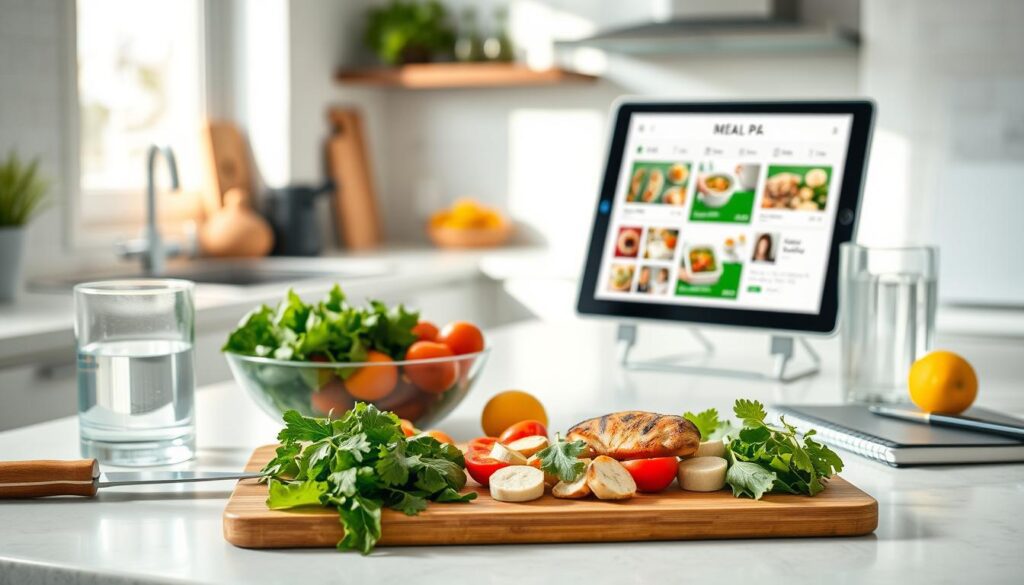
Setting Realistic Goals
Begin with SMART goals: Specific, Measurable, Achievable, Relevant, Time-bound. Aim to lose 1-2 pounds each week. For instance, “I’ll cut 500 calories daily by next Monday.” Keep track of your progress each week to stay on track.
Choosing Foods You Enjoy
Eating well means enjoying your food. Use an 80/20 approach: Eat 80% nutrient-rich foods like grilled chicken or quinoa, and 20% treats like dark chocolate. Swap unhealthy cravings with healthier options—like zucchini noodles instead of pasta.
Meal Prep Tips for Success
- Weekly planning: Spend Sunday planning meals for the week using a calendar or app.
- Batch cooking: Cook proteins like roasted chicken or lentils in bulk for quick meals during the week.
- Storage hacks: Use airtight containers and label them with meal names and dates.
Short on time? Try quick recipes like stir-fry or salads. Change up recipes weekly to avoid boredom—add different spices or veggies to classics like soups or rice bowls.
Remember: meal prep for weight loss is all about being flexible. Adjust portions or ingredients as needed. Small, consistent steps lead to lasting habits!
Breakfast Ideas for Weight Loss
Start your day with meals that fuel your body and support your goals. These breakfast ideas fit well into your weight loss meal plan. They offer protein and fiber to keep hunger away.
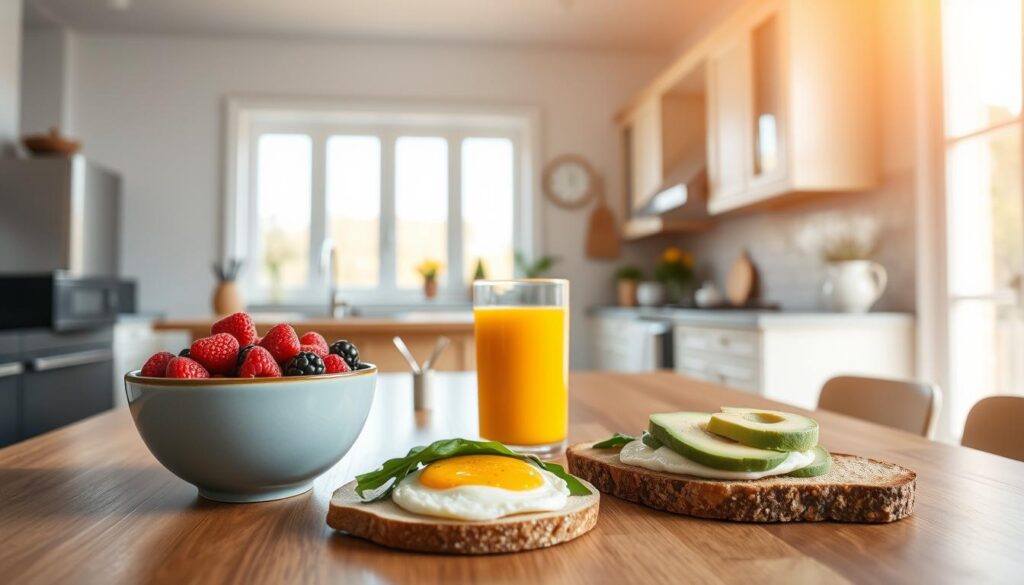
High-Protein Smoothies
- Green Protein Boost: Blend spinach (1 cup), frozen banana (½), unsweetened almond milk (½ cup), and vanilla protein powder (2 scoops). Total: 25g protein, 300 calories.
- Mango Sunrise: Mix frozen mango (½ cup), Greek yogurt (¾ cup), chia seeds (1 tbsp, and flaxseed milk (1 cup. Low-sugar, high-fiber option.
Overnight Oats Variations
Mix rolled oats (½ cup) with unsweetened almond milk (½ cup) and chia seeds (1 tbsp). Refrigerate overnight. Try these flavor combos:
- Apple Cinnamon: Add diced apple and cinnamon.
- Chocolate Peanut Butter: Stir in 1 tbsp natural peanut butter and cocoa powder.
- Berry Almond: Toss in frozen berries and sliced almonds.
Healthy Egg Dishes
Cook protein-rich eggs in creative ways:
- Frittata Muffins: Whisk eggs with veggies (spinach, tomatoes), pour into muffin tins, bake at 350°F for 15 minutes.
- Avocado Egg Boats: Halve an avocado, remove pit, fill with scrambled eggs and salsa.
These recipes keep you full and align with a healthy meal plan for weight loss. They avoid added sugars and refined carbs. Add a handful of nuts or berries for extra fiber.
Lunch Options That Keep You Full
Choosing the right lunch is key for a healthy eating plan for weight loss without midday cravings. These meals have the right mix of protein, fiber, and healthy fats. They keep your energy up until dinner.
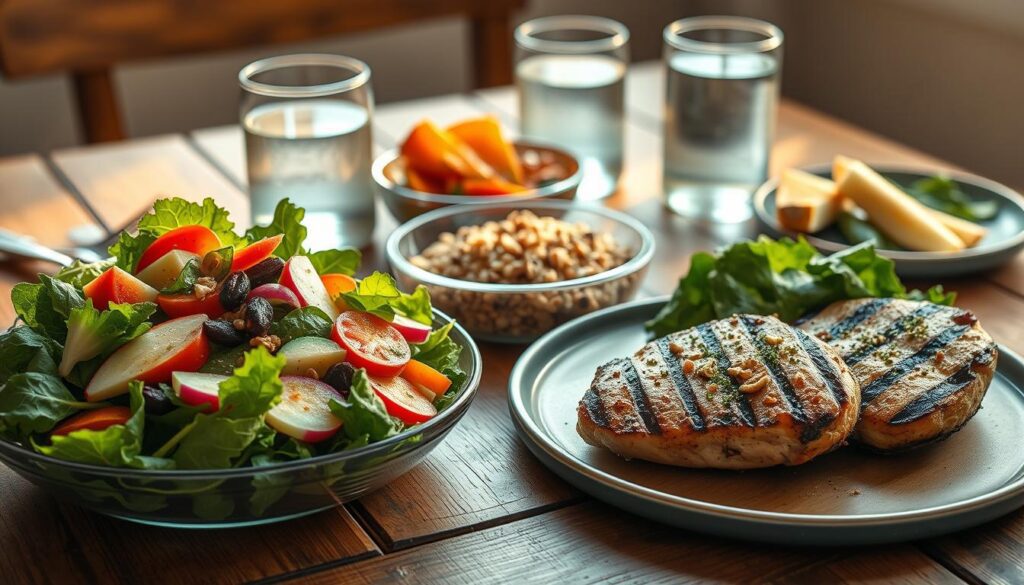
Salad Bowls with Lean Protein
Start with a 4-6oz base of grilled chicken, tofu, or shrimp. Add 1/2 cup of roasted veggies like broccoli and bell peppers. Then, add 1/4 cup of quinoa or brown rice. Finish with a light dressing like lemon-tahini or Greek yogurt. Here’s an example:
| Component | Example |
|---|---|
| Protein | Grilled salmon (5 oz) |
| Vegetables | Steamed edamame & spinach |
| Grain | 1/2 cup farro |
| Healthy Fat | 1 tbsp chia seeds |
Whole Grain Wraps
Choose wraps under 400 calories for a high-fiber option:
- Black bean & corn tortilla wrap (8″ whole wheat)
- Grilled chicken with hummus spread + shredded lettuce
- Microwaveable option: Turkey and spinach wrap reheated safely
Vegetable Stir-Fries
Follow this simple formula:
- Heat 1 tsp olive oil in a skillet
- Cook 4 oz protein (tofu, shrimp, or tempeh)
- Add 1.5 cups mixed vegetables (zucchini, mushrooms, carrots)
- Finish with 2 tbsp low-sodium soy sauce
Pair it with 1/2 cup cooked buckwheat for extra fiber. My favorite trick: store leftovers in airtight containers for up to 3 days.
Delicious Dinner Recipes for Weight Loss
Your diet meal plan for weight loss shouldn’t sacrifice flavor. These dinners are hearty and satisfying, fitting your goals. They focus on protein, fiber, and balance to keep you full without overeating.
I’ve made these options easy to prepare and fit into a weight loss meal plan. Choose quality ingredients and smart cooking methods to avoid added sugars or excess oil.
Grilled Chicken and Quinoa
Marinate chicken breasts in olive oil, garlic, lime juice, and smoked paprika for 30 minutes. Grill until charred, then serve over quinoa. Add roasted asparagus or zucchini. Tip: Leftovers are great for lunch.
Baked Salmon with Veggies
Season salmon fillets with salt and pepper. Bake at 400°F (200°C) for 12–15 minutes. Try these flavor twists:
- Miso-Miso: Brush with a mix of white miso, maple syrup, and sesame oil.
- Dill-Mustard: Combine fresh dill, Dijon mustard, and a dash of honey.
Roast Brussels sprouts and carrots on the same pan for a one-pan meal.
Vegetarian Chili
Saute diced onions and garlic, then simmer with kidney beans, black beans, and tempeh. Add chili powder, cumin, and smoked paprika. Simmer for 20 minutes. Serve with Greek yogurt. Portion note: 1 cup chili + ½ cup cooked quinoa per serving.
These dinners offer protein-rich, fiber-packed options to support your goals. Adjust seasoning to taste, but keep sodium low with fresh herbs. Pair with a side salad for added volume without extra calories.
Healthy Snacks to Curb Cravings
Choosing the right snacks is key to a best meal plan for losing weight. Pick snacks that are full of nutrients to avoid overeating and keep your energy up. The best snacks are 100-200 calories, eaten 3-4 hours after meals. They should have protein, fiber, and healthy fats.
Nutritious Energy Balls
- Almond-Date Balls: Blend 1/2 cup almonds, 1/4 cup dates, and 1 tbsp chia seeds. Form into 1-inch balls (140 calories each).
- Coconut-Cacao Bites: Mix unsweetened shredded coconut, cacao powder, and a dash of vanilla extract with melted almond butter. Refrigerate for 1 hour (120 calories per serving).
Fresh Vegetable Sticks
Pair crunchy veggies with small portions of dips. Slice bell peppers, cucumber, and jicama. Serve with 2 tbsp hummus or a tangy Greek yogurt dip seasoned with garlic powder.
Greek Yogurt Options
- Sweet Fix: Top plain Greek yogurt with 1/2 cup fresh berries and a sprinkle of cinnamon.
- Savory Twist: Mix yogurt with diced cucumber, dill, and a squeeze of lemon.
Adding these snacks to your weight loss meal plan helps keep hunger away. Focus on whole foods and watch your portion sizes to meet your calorie needs. These snacks help you eat mindfully, not out of habit.
Staying on Track with Your Meal Plan
Staying consistent with meal planning for weight loss is more than just wanting to. It’s about tracking progress, making adjustments, and getting support. This approach keeps me motivated without feeling too strict.
Tracking Your Progress
I start by taking weekly waist measurements and monthly photos. These help me see changes that go beyond just weight. I use MyFitnessPal to log my meals, but I focus on portion sizes, not calories. Seeing better energy levels or clothes that fit better is proof of progress.
- Weigh and measure weekly
- Take body photos every 28 days
- Journal hunger/fullness cues daily
Adapting Your Plan as Needed
If I hit a roadblock, I tweak my meal prep for weight loss plan. Swapping rice for cauliflower or adding a protein shake can make a difference. I might change my carb intake or reduce portions in the evening to get back on track.
Support Systems: Friends and Family
“Meal prepping with my sister tripled my consistency.” – Mark, 28, 50-lb loss
I share my goals with others to stay accountable. At restaurants, I ask for smaller portions and make healthier swaps. My running group and I share weekly updates, and I join Facebook groups for tips. My family helps with grocery shopping to stay involved.
I allow myself one cheat meal a week, but I also prep healthier options. When I travel, I bring snacks like pre-cut veggies and protein bars. Being flexible helps me stay on track without feeling guilty.
Long-Term Strategies for Weight Maintenance
Keeping weight off is more than just a quick fix. Turn your healthy eating plan into daily habits that match your lifestyle. Here’s how to make lasting changes that stick long after goals are met.
Building Healthy Habits
Start by replacing old habits with small, easy actions. For instance, making veggies your go-to snack becomes a habit over time. Meal prepping each week keeps your healthy eating plan consistent. These habits become second nature as time goes on.
Importance of Regular Exercise
Keeping weight off requires more exercise than losing it. Aim for at least 150 minutes of moderate activity each week. Mix in strength training and cardio to keep your metabolism up. Even short walks count towards your daily goals.
Staying Motivated Over Time
Focus on non-scale wins like better sleep or more energy. Keep your meal plan fresh and fun. Celebrate small victories, like fitting into old clothes, to stay motivated on your health journey.
These strategies make your healthy meal plan a lifelong tool. Small, consistent steps build habits that support lasting wellness without extreme restrictions. Adapt as needed, and choose habits that fit your daily life.
FAQ
What is a healthy meal plan for weight loss?
How can I create an effective meal plan for weight loss?
What is the best meal plan for losing weight?
How do I make sure my meal planning for weight loss is successful?
Can I snack while following a diet meal plan for weight loss?
What role does hydration play in a healthy eating plan for weight loss?
How can I maintain weight loss after reaching my goals?
Are there any specific foods I should include in my nutritious meal plan for weight loss?
Did you like this article? See also: How to Lose Weight Without Extreme Diets | Easy Tips

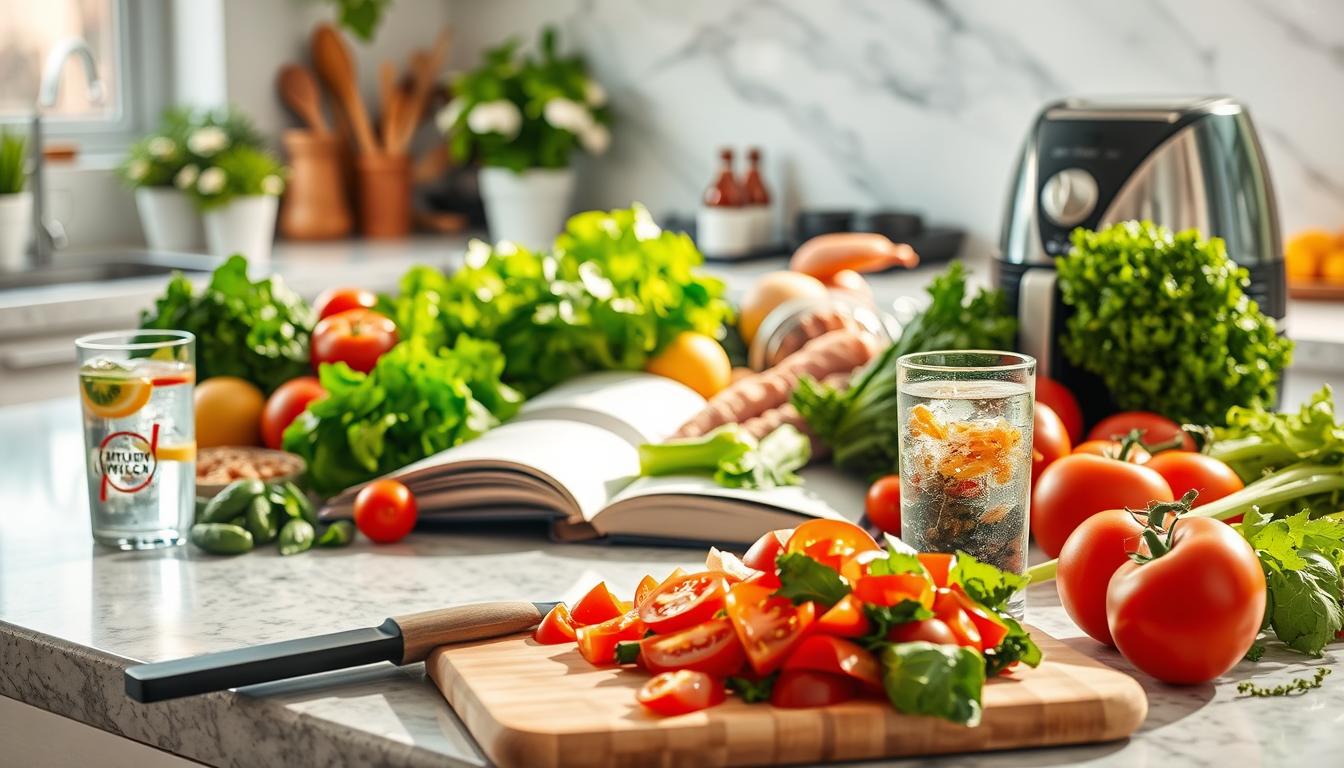
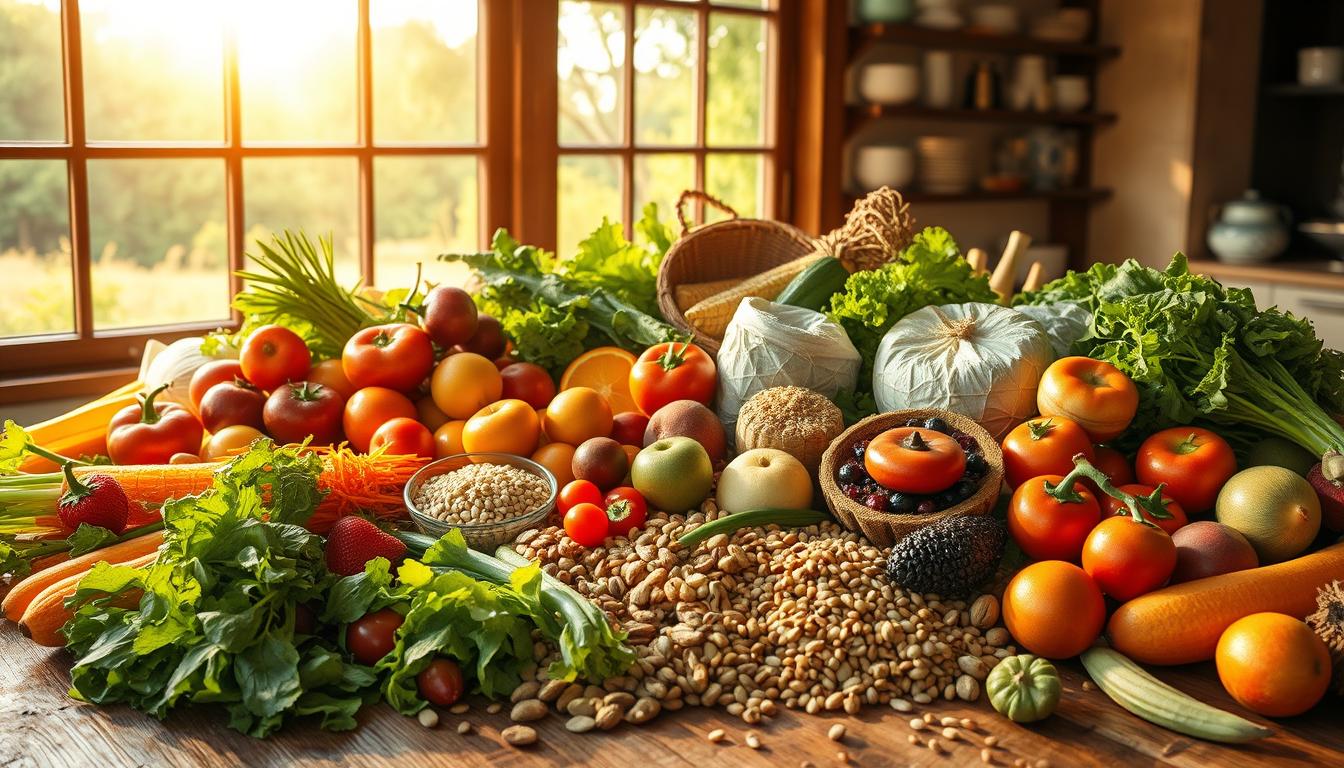

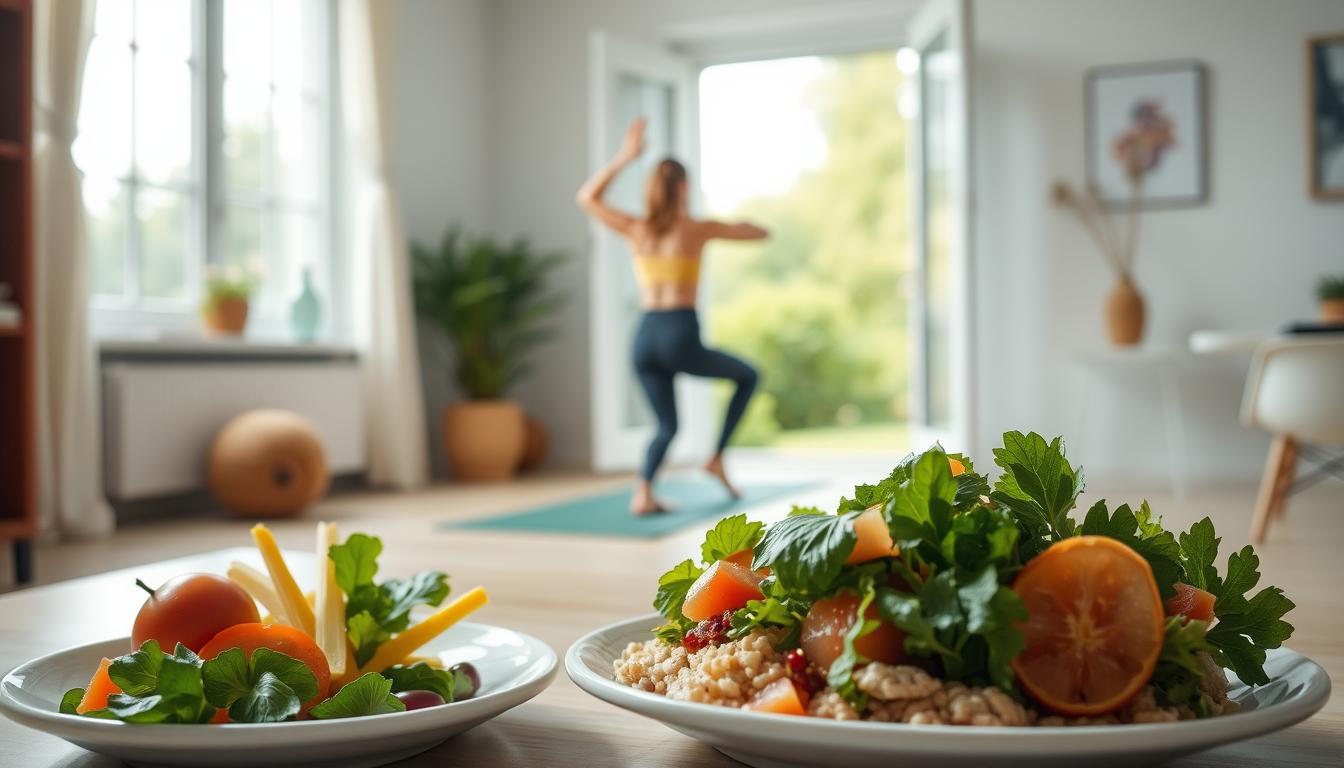



Comment on “Achieve Your Weight Loss Goals with This Healthy Meal Plan”